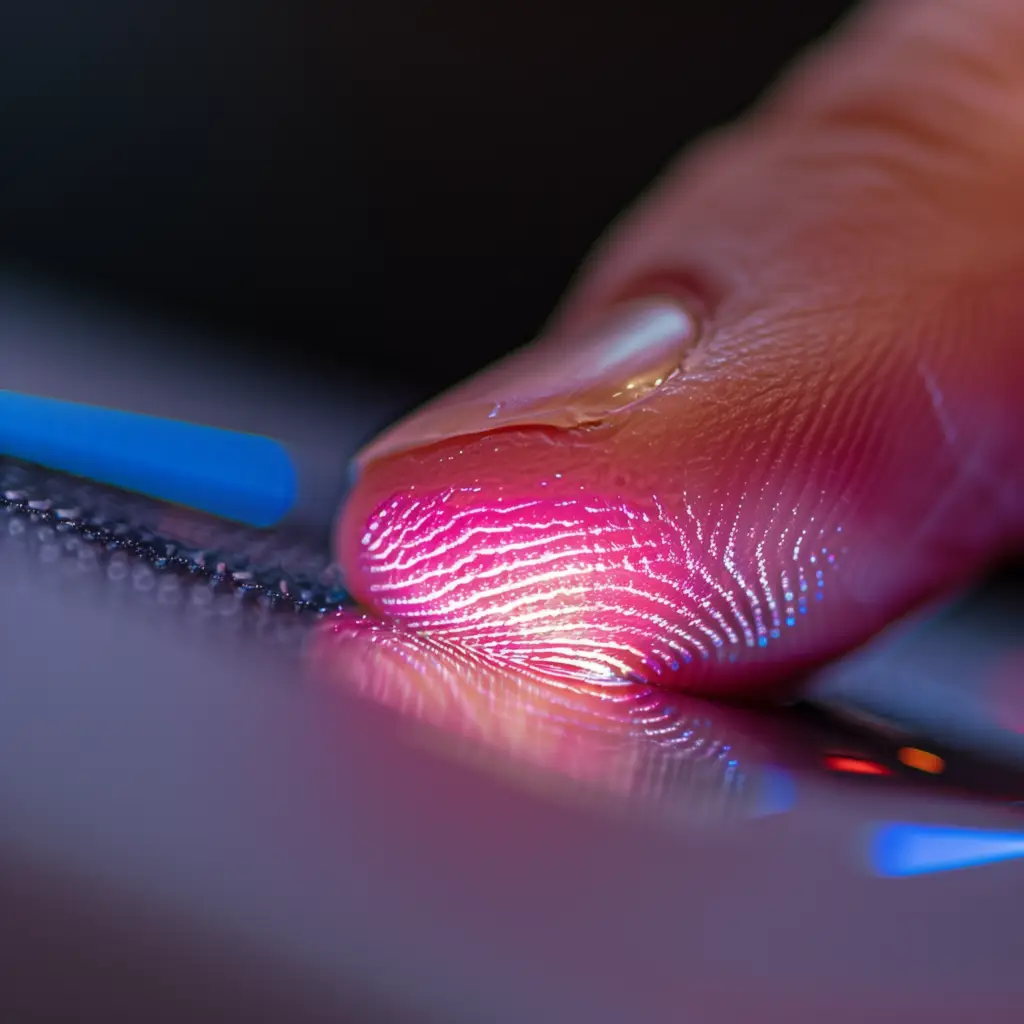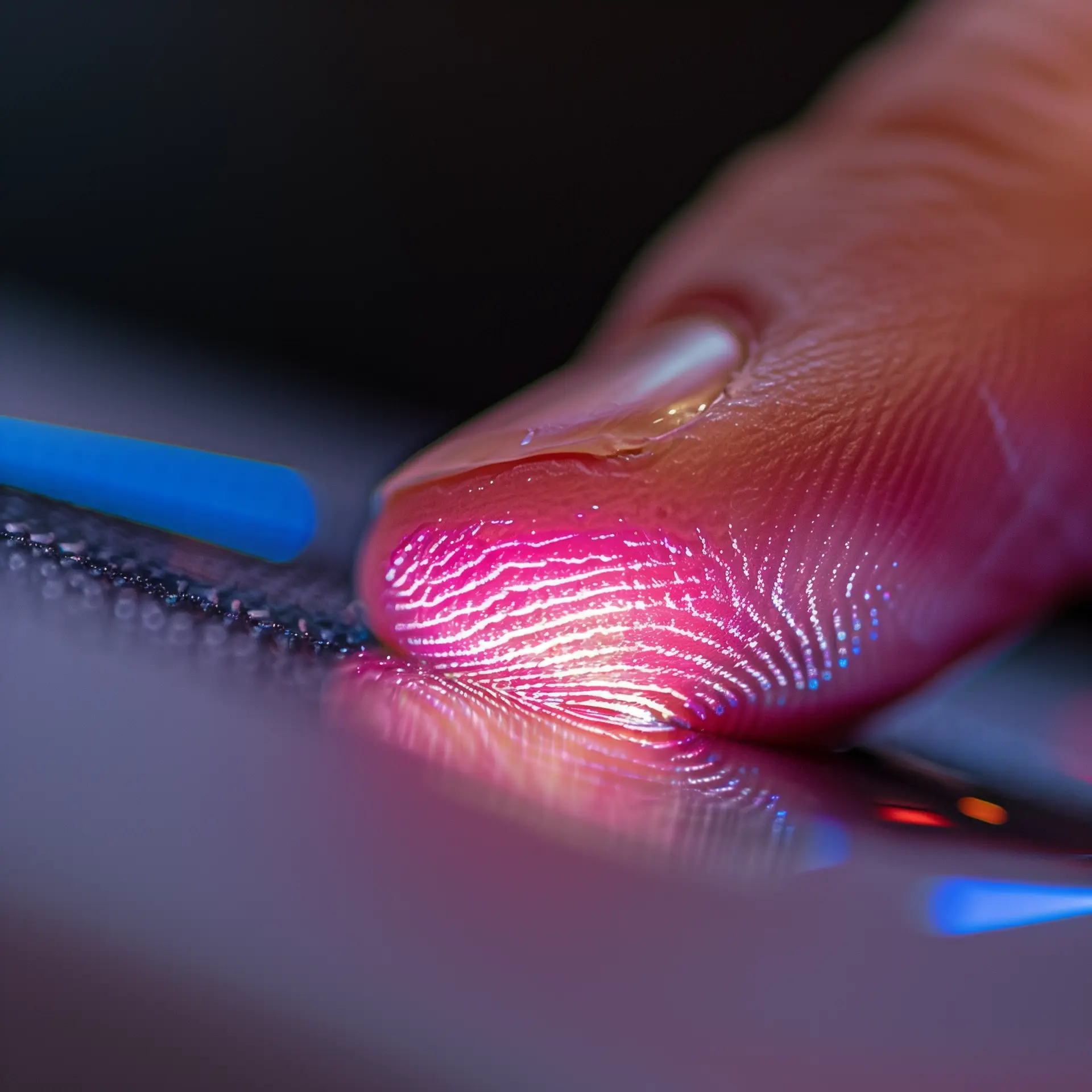Fingerprint background checks are becoming an integral part of the hiring process across various industries. With advancements in biometric screening technology, employers can access accurate and reliable data to make informed hiring decisions. This guide delves into everything you need about fingerprint background checks, from their benefits and limitations to the process and the legal considerations involved.
Key Takeaways
- Fingerprint background checks use biometric data to provide a tamper-proof and reliable verification of an applicant's identity and criminal history.
- The fingerprint scanning involves capturing fingerprints through live scans or traditional ink-and-roll methods. The fingerprints are then compared against databases like the FBIâs IAFIS.
- These checks offer high accuracy and security, significantly reducing the risk of identity theft and fraud in hiring.
- Employers and job seekers benefit from the enhanced security, trust, and efficiency of fingerprint background checks.
- Compliance with laws, including obtaining informed consent and safeguarding biometric data, is crucial when implementing fingerprint background checks.
Introduction
Fingerprint background checks are no longer just the stuff of spy movies and high-security clearances. As we pivot towards an era of heightened security and accountability, these checks have surged in popularity across various employment sectors. Whether youâre a business owner looking to safeguard your operations, an HR professional securing top-tier talent, or a job seeker aiming to bolster your credibility, understanding fingerprint background checks is crucial.
This guide aims to unpack the nuts and bolts of fingerprint background checks, walking you through the process, benefits, legal nuances, and typical questions. By the end, youâll be able to navigate this increasingly common aspect of modern hiring confidently.

What Are Fingerprint Background Checks?
Fingerprint background checks are a modern approach to verifying an applicant's identity and criminal history through biometric screening. Unlike traditional background checks that primarily rely on personal information such as Social Security numbers, residences, and employment history, fingerprint background checks provide a more reliable and tamper-proof identification method.
Defining the Concept
At its core, a fingerprint background check involves capturing and analyzing an individual's unique fingerprint patterns to check against a database of criminal records and other relevant data. This method is less prone to errors and manipulations affecting traditional background checks. Fingerprints are unique to each person and remain consistent over time, which makes them an incredibly reliable form of identification.
How They Work
The process begins with capturing the applicant's fingerprints using specialized devices. There are primarily two methods for capturing fingerprints: live scan and ink-and-roll. Live scanning is the more modern technique, where an electronic device scans fingerprints and creates a digital image. Ink-and-roll is the traditional method where the fingers are inked and rolled onto a paper card.
Once the fingerprints are captured, they are sent to a database for comparison. In the U.S., one of the most common databases used is the FBIâs Integrated Automated Fingerprint Identification System (IAFIS). This system can swiftly compare the applicant's fingerprints against millions of other records to identify any matches.
Fingerprint Identification
Fingerprint identification is crucial for verifying an individualâs identity and can potentially uncover past criminal activities. This verification process can take just a few minutes to a couple of days, depending on the speed of the background check service and the comprehensiveness of the databases being queried. When a match is found, the specific details of the criminal record or other pertinent information are provided to the requesting employer or agency, allowing them to make a more informed hiring decision.
In summary, fingerprint background checks offer high security and accuracy in hiring. By leveraging unique biometric data, these checks minimize the risk of fraud and identity theft, providing employers with unparalleled peace of mind.
The Biometric Screening Process
Data Collection
Two primary methods for collecting fingerprints for background checks are live scan and ink and roll. Live scan technology is increasingly preferred due to its speed and efficiency. This method captures a candidate's fingerprints digitally using a specialized scanner. The digital images are then directly uploaded into the system, reducing errors associated with manual handling.
On the other hand, the traditional ink and roll method involves pressing the fingers onto an ink pad and then rolling them onto paper to create an impression. While this method is still in use, it's slower and more prone to smudging and misprints, leading to delays and inaccuracies.
Fingerprint Database
Once fingerprints are collected, they are sent to a database for comparison. Most background checks in the United States involve the Integrated Automated Fingerprint Identification System (IAFIS), managed by the FBI. IAFIS is a nationwide fingerprint and criminal history system that houses millions of fingerprint records from law enforcement agencies nationwide.
IAFIS scans its extensive database to find a match when a candidate's fingerprints are submitted. If a match is found, the system pulls up any associated criminal history, allowing employers to review potential red flags quickly. The entire process is streamlined and typically takes only 24-72 hours, depending on the volume of requests and specific system efficiencies.
Accuracy and Reliability
Fingerprint background checks are renowned for their high accuracy. Fingerprints are unique to each individual, making them reliable for verifying someone's identity. The accuracy rate of fingerprint identification is exceptionally high, often cited as over 99%. This level of precision largely eliminates the risk of false positives, where someone is incorrectly matched to a criminal record.
However, it's worth noting that the system is only as reliable as the database it references. If someoneâs fingerprints have never been captured before, the database will have no record to match against, which could present an incomplete picture. Despite this limitation, fingerprint background checks remain a robust and trustworthy tool for employers to verify candidate identities and screen for criminal behavior effectively.
Benefits of Fingerprint Background Checks
For Employers
Fingerprint background checks offer several significant advantages for employers, ensuring a more secure and trustworthy hiring process.
Enhanced Security
Incorporating fingerprint background checks into your hiring process dramatically enhances security. The reliability of biometric data provides a robust safeguard against fraud and misrepresentation, ensuring you're not just taking a candidate's word at face value. This increased reliability helps you make hiring decisions with greater confidence and peace of mind.
Identity Verification
Fingerprint background checks are a powerful tool for verifying an applicant's identity. Employers can effectively prevent identity theft and fraudulent applications by directly linking the biometric data to the individual. Ensuring that the person in front of you is indeed who they claim to be aids in building a trustworthy workforce.
Additional Research: Fingerprint background checks are considered more reliable than name-based checks due to their ability to provide identification and eliminate false positives and negatives. This is particularly important in hiring processes where accurate background checks are crucial. See National Fingerprint Based Background Checks Steps for Success.
Comprehensive Screening
With fingerprint background checks, employers can access various information from federal, state, and local records. This level of comprehensiveness allows for a more thorough vetting process, providing insights that may be missed through traditional background checks. It's particularly valuable for positions where background integrity is non-negotiable.
Applicable in High-Security Jobs
Certain roles demand an exceptional level of trust and security. Fingerprint background checks are indispensable for employers in industries like healthcare, transportation, or finance, where the margin for error is slim. They help ensure that only the most reliable and trustworthy individuals are entrusted with critical responsibilities.
Fingerprint background checks provide a multi-faceted layer of security and peace of mind, making them a valuable tool for any employer hiring the best candidates.
For Job Seekers
Fingerprint background checks aren't just a hoop to jump throughâthey can be a powerful ally in your job search. From building trust to speeding up the hiring process, here's why they might just become your new best friend.
Trust and Integrity
In today's ultra-competitive job market, demonstrating your trustworthiness and integrity is invaluable. Fingerprint background checks can help you do just that. You're a transparent, trustworthy candidate when employers see you've willingly undergone this thorough screening. This can be particularly advantageous when applying for positions that require handling sensitive information or where a high degree of trustworthiness is essentialâthink healthcare, banking, or any role involving financial transactions.
Speed and Efficiency
One of the often-overlooked perks of fingerprint background checks is their speed. Traditional background checks can be time-consuming, involving multiple steps and various sources. Fingerprint checks often streamline this process, offering a faster turnaround. You can get hired quicker, start earning sooner, and move forward with less waiting.
While background checks might feel like a barrier, think of them instead as a seal of integrity and efficiency on your application, easing the minds of potential employers and putting your best foot forward in your career journey.
Legal Considerations
Navigating the legal landscape around fingerprint background checks is non-negotiable. Failure to comply can result in severe penalties and damage your company's reputation. Here's a streamlined look at the key legal aspects you need to keep on your radar:
Compliance with Laws
Fingerprint background checks must align with federal and state laws. The Fair Credit Reporting Act (FCRA) is particularly central here. The FCRA mandates that employers inform candidates that a background check will be conducted and obtain their written consent. Additionally, candidates must be informed and given a copy of the report if an adverse hiring decision is made based on the results. State laws may impose additional requirements, so staying informed about jurisdiction-specific legislation is crucial.
Consent Requirements
Before proceeding with fingerprint background checks, obtaining informed consent is a critical step. This means communicating the purpose and scope of the check and how the collected data will be used. A simple checkbox on an application form isnât sufficientâyour consent form should explicitly state that fingerprint information will be collected and screened. This transparency helps build trust and ensures legal safeguarding for the employer.
Privacy Concerns
Handling biometric data comes with the responsibility of safeguarding it. The sensitivity of fingerprint information necessitates stringent data protection measures to prevent unauthorized access or data breaches. Laws like the Biometric Information Privacy Act (BIPA) outline specific guidelines for collecting, storing, and destroying biometric data. Employers must ensure that candidates' data is securely encrypted and that access is restricted to authorized personnel only. Developing a clear data retention and disposal policy can further mitigate privacy risks.
Industries That Benefit Most from Fingerprint Background Checks
Fingerprint background checks offer a robust layer of security and reliability that is becoming essential across various industries. Hereâs a breakdown of sectors where fingerprinting can make a significant difference:
Staffing Agencies
With high turnover and diverse placements, staffing agencies can ensure they are recommending reliable candidates to employers. Fingerprint checks verify backgrounds across federal, state, and local levels, minimizing the risk of placing someone with a problematic history.
Healthcare
In a field where patient safety and trust are paramount, fingerprint background checks help confirm that healthcare professionals have clean records and the necessary licenses. This is critical for roles involving direct patient care and access to sensitive information.
Transportation
Whether hiring truck drivers, pilots, or public transit operators, ensuring employees have no criminal history is vital for public safety. Fingerprint checks provide a thorough vetting process to avoid potential risks on the road or in the air.
Tenant Screening
Property managers and landlords can use fingerprinting to confirm tenant identities and check for past criminal behavior. This helps create a safer living environment for all residents.
Non-Profit
Organizations working with vulnerable populations, such as children or the elderly, must ensure that volunteers and staff have clean backgrounds. Fingerprint checks help maintain trust and safety within the community.
Retail
To mitigate risks of theft and fraud, retailers can screen employees thoroughly. High turnover positions and access to cash or inventory make thorough background checks essential for loss prevention.
Technology
Protecting intellectual property and sensitive data is critical. Fingerprint background checks help tech companies ensure that employees handling proprietary information have no criminal background, thereby protecting their assets.
Hospitality
In an industry focused on customer experience and safety, fingerprint checks help verify that staff members pose no threat to guests or property. This includes roles ranging from management to housekeeping.
Integrating fingerprint background checks into hiring processes within these industries heightens security and enhances overall trust and integrity. By leveraging biometric screening, organizations can make more informed hiring decisions and maintain a safer, more reliable workforce.
Limitations and Challenges
Cost
Implementing fingerprint background checks comes with a price tag. The cost can vary depending on factors such as the volume of checks conducted, the type of technology used, and the fees charged by service providers. Generally, fingerprint checks are more expensive than traditional background checks, primarily because of the specialized equipment and access to national databases required. While large companies might absorb these costs more easily, smaller businesses and non-profits might find them prohibitive, potentially limiting their ability to leverage this technology.
False Positives/Negatives
Though fingerprint background checks boast high accuracy rates, they are not infallible. There is always a risk of false positives or negatives. A false positive occurs when an applicant is mistakenly identified as having a criminal record, which can lead to unfair disqualification from the hiring process. Conversely, a false negative means that a person's criminal record goes undetected, posing potential security risks. Employers must have clear protocols for handling these occurrences, including secondary verification methods and allowing candidates to dispute inaccurate results.
Additional Research: Fingerprint background checks, while considered reliable, are not immune to errors. Research has shown that cognitive biases can affect fingerprint examiners, leading to potential inaccuracies in the results. This highlights the need for rigorous quality control measures to ensure the reliability of fingerprint background checks in hiring processes. See Fingerprinting: A Study in Cognitive Bias and its Effects on Latent Fingerprint Analysis
Accessibility
Access to fingerprinting facilities can be another considerable hurdle. While urban areas may have multiple locations offering fingerprinting services, rural or remote regions might lack such amenities, making it challenging for applicants to comply with fingerprinting requirements. Additionally, not all smaller organizations have the resources to set up in-house facilities or establish relationships with nearby providers. This limitation can delay the hiring process and place an undue burden on candidates, potentially causing talented individuals to drop out of the application process altogether.
The Future of Fingerprint Background Checks
Technological Advancements: Fingerprint background checks are on the brink of transformative changes thanks to rapid advancements in biometric technology. One of the most exciting developments is incorporating more sophisticated algorithms powered by AI and machine learning. These new algorithms promise to enhance fingerprint-matching accuracy, reducing the risk of false positives and negatives. Emerging technologies like contactless fingerprint scanners are gaining traction on the hardware front. These devices can capture high-quality prints without physical touch, making the process faster, more hygienic, and less prone to errors caused by smudges or pressure issues.
Integration with Other Systems: In the future, fingerprint background checks will seamlessly integrate with broader HR and security systems. Current trends suggest organizations are moving towards holistic platforms where biometric data feeds directly into the HR software, automating and streamlining the hiring process. This integration will allow for real-time data sharing between departments, making it easier to flag potential issues early on. Additionally, fingerprint data could link with other biometric markers, such as facial recognition or iris scans, offering multi-layered security and further validating an individualâs identity. The convergence of these technologies will ultimately lead to more robust, efficient, and secure background-checking protocols.
The trajectory of fingerprint background checks is undoubtedly upward, leveraging new tech to enhance reliability and integration within organizational workflows. These advancements will play a pivotal role in shaping the future landscape of hiring and security.
Frequently Asked Questions (FAQ)
What is the difference between a fingerprint background check and a traditional background check?
A fingerprint background check uses biometric data to confirm a candidate's identity and check their records against various databases, providing a higher level of accuracy. Traditional background checks rely on names, social security numbers, and sometimes documentation provided by the candidate, which can be subjected to human error or manipulation.
How long does the fingerprint background check process take?
The duration can vary, but typically, a fingerprint background check takes 24 to 72 hours after the fingerprints are submitted. Factors affecting this timeframe can include the efficiency of the fingerprinting service and the responsiveness of the databases being checked.
Are there any roles where fingerprint background checks are mandatory?
Yes, certain positions, particularly those involving high security, safety-sensitive duties, or vulnerable populations, often require fingerprint background checks. These roles include healthcare professionals, childcare workers, transportation personnel, and positions within government agencies.
What should candidates do if they have a criminal record?
Candidates should be honest about their criminal history during the application process. Itâs advisable to provide context or evidence of rehabilitation. Many employers appreciate transparency and the steps taken towards personal improvement. Additionally, certain state laws protect candidates from discrimination based solely on criminal records, ensuring a fair evaluation process.
Conclusion
Fingerprint background checks represent a significant shift from traditional methods, but they offer many benefits that make them invaluable tools in modern hiring practices. Throughout this guide, we've outlined how these checks offer enhanced security, reliable identity verification, and comprehensive screening capabilities. We've also delved into the legal considerations, emphasizing the need for compliance with laws and protecting candidates' biometric data.
Adopting fingerprint background checks can significantly bolster your organization's hiring process, particularly in sectors with high security and trust requirements. The technology's ability to provide accurate and quick results streamlines hiring and establishes a foundation of trust and integrity.
As the hiring landscape continues to evolve, staying ahead by integrating fingerprint background checks is not only prudent but essential for making informed and secure hiring decisions. Now is the time to explore incorporating these checks into your process to secure a more reliable and trustworthy workforce.
For further reading, check out this SHRM toolkit for conducting background investigations and learn about potential background check red flags that employers look for.

GCheck Editorial Team
Meet the GCheck Editorial Team, your trusted source for insightful and up-to-date information in the world of employment background checks. Committed to delivering the latest trends, best practices, and industry insights, our team is dedicated to keeping you informed.
With a passion for ensuring accuracy, compliance, and efficiency in background screening, we are your go-to experts in the field. Stay tuned for our comprehensive articles, guides, and analysis, designed to empower businesses and individuals with the knowledge they need to make informed decisions.
At GCheck, we're here to guide you through the complexities of background checks, every step of the way.





